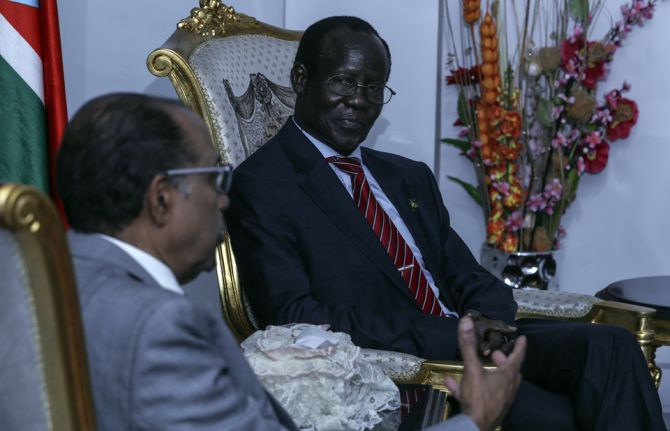

Feature Story
South Sudan: raising the profile of HIV in humanitarian contexts
15 June 2018
15 June 2018 15 June 2018In South Sudan, 7 million people are in need of humanitarian assistance and 5 million people need access to health services, including HIV prevention and treatment services. In this context, AIDS does not stand in isolation; rather, it is an entry point for social transformation. This was the message of Michel Sidibé, UNAIDS Executive Director, during his recent visit to the country.
“We all know the challenges that South Sudan is facing. But during this visit I have been humbled and impressed. I have seen that, despite challenges, when people on the ground are committed, anything is possible,” said Mr Sidibé.
While in South Sudan, Mr Sidibé signed a memorandum of understanding on the right to health in the education sector with the Ministry of Health, the Ministry of Education and Instruction and the South Sudan AIDS Commission. The agreement commits all parties to develop and implement a strategy in line with the UNAIDS Fast-Track approach and the Ministerial Commitment on Comprehensive Sexuality Education and Sexual and Reproductive Health Services for Adolescents and Young People in Eastern and Southern African, of which South Sudan is a signatory.
In 2016, an estimated 200 000 people were living with HIV in South Sudan. In addition, only 10% of people living with HIV were accessing life-saving HIV treatment. Children are particularly vulnerable, with fewer than 1000 children living with HIV between the ages of 0 and 14 years on HIV treatment—5% of those in need.
To accelerate results in the AIDS response, James Wani Igga, the Vice-President of South Sudan, in the presence of Mr Sidibé, launched the 2018–2022 South Sudan National Strategic Plan on HIV and AIDS, which will provide a solid monitoring and evaluation framework for the implementation of the national AIDS response.
“Stigma often leads to discrimination and other violations of human rights that affect the well-being of people living with HIV. HIV-related stigma is compounded for those individuals who identify with already stigmatized groups, including sex workers and men who have sex with men,” said Mr Igga.
Mr Sidibé also discussed with Mr Igga how more can be done together to address HIV in South Sudan, with a particular focus on HIV among uniformed personnel as a key entry point. They discussed how the AIDS response can build resilience, protect rights and promote freedom from violence, peace and stability in South Sudan.


